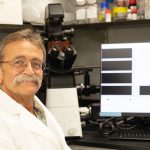
Brain-on-a-chip simulated models hold the potential to revolutionize and accelerate the way new drugs are discovered.
A UCF researcher’s work to create a “brain-on-a-chip” aims to improve neurological disorder research by speeding up drug discovery and providing an alternative to animal testing.
James Hickman — professor of chemistry, biomolecular sciences and electrical engineering — recently published some of his latest findings in the journals Stem Cell Reports and Advanced Therapeutics.
These studies explain advancements in his research group’s efforts to develop the functional neural model otherwise known as a “brain-on-a-chip.” Such a model could revolutionize neurological research by replicating the pathologies of neurological disorders and rare autoimmune neuropathies, without the need for testing on human or animal subjects.
The Stem Cell Reports paper demonstrated the capability to grow and differentiate cortical neurons — known to be responsible for a majority of higher brain function — into fully mature and functional cells.
These neurons were then incorporated into a circuit functioning as a simulated system, where the researchers were able to induce long-term potentiation (LTP). LTP — which allows for memory formation — is a key phenomenon in the study of cognition, and one that has mostly evaded direct observation in human models.
The World Health Organization estimates that about 55 million people worldwide suffer from Alzheimer’s and related dementias affecting cognition.
Studies performed on immature stem cells or mature primary cells cannot show the impact of these disorders before they escalate to full-blown cell death.
Simulated models like Hickman’s, however, could get ahead of the disease — allowing researchers to test whether a drug is capable of lessening early-stage effects or preventing symptoms entirely.
Hickman’s project uses pluripotent stem cells — derived from somatic cells, and capable of self-renewing and developing into any type of cell in the human body — as a starting material.
“We can take pluripotent stem cells and differentiate them into mature cortical neurons,” Hickman says. “So, now, there are two ways of doing drug discovery: targeting a protein within a certain biochemical pathway, which is how the majority of pharmaceutical companies do it, and what we do — taking the complex system and creating a phenotypic model.”
“If we can test the phenotypic disease model and bring it to the same function as the non-disease model with a therapeutic, then the FDA will likely accept that as data that proves efficacy, allowing a drug to go forward if there is acceptable safety data,” he says.
In this way, the phenotypic model — created as part of Hickman’s Hybrid Systems Lab’s goal of “engineering the interface between biological and non-biological systems to construct next-generation systems for toxicology, drug discovery and basic biology research” — could also provide an alternative to animal testing.
UCF has licensed many of the patents on which Hickman is an inventor to Hesperos, a company he helped launch. At both Hesperos and the Hybrid Systems Lab, researchers work to advance neural modeling to the point where neurological disorders — and especially rare diseases — are no longer treated as unmanageable.
In the Advanced Therapeutics study, the researchers demonstrated that a model similar to the one used in the Stem Cell Reports study could be used to recreate the pathology of two rare autoimmune neuropathies: chronic inflammatory demyelinating polyneuropathy and multifocal motor neuropathy. Then, the research group tested how a Sanofi compound affected the modeled pathologies. They were able to establish efficacy with their platform, allowing the drug to move to Phase II clinical trials — thus bringing it one step closer to helping patients suffering from these diseases.
Hickman says these recent discoveries indicate the researchers “potentially have a screen where we can look at therapeutics before the cells start dying, which would tell us if one could reverse the effects of a disorder.”
Hickman received his Ph.D. in chemistry from MIT in 1990 and has worked at UCF since 2004.
Original story here